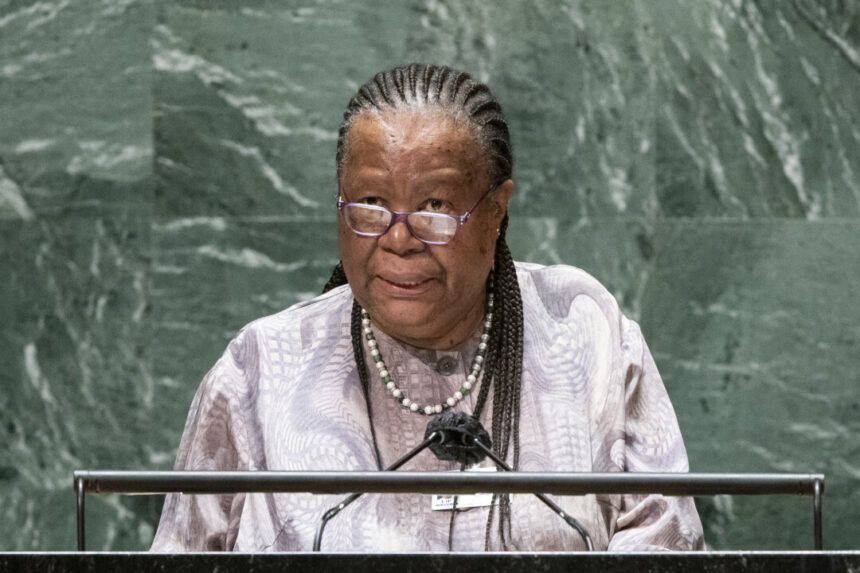South Africa’s government warns the US not to punish it for having relations with its enemies, stating that Americans rely on Pretoria’s minerals. In response to potential repercussions from Washington for actions against its policies, South Africa’s Minister of International Relations, Naledi Pandor, wrote in the Financial Times that such actions could be “self-sabotage” for the US. She emphasized South Africa’s role in the African Continental Free Trade Agreement and highlighted the country’s importance as a key supplier of minerals critical for various industries. The article also noted that the US imports essential minerals like chromium from South Africa. The South African government’s stance has been met with criticism from experts who view it as arrogant and potentially detrimental to relations with the US. The article also highlighted historical tensions between the US and South Africa, particularly during the apartheid era. The South African government’s close ties with Russia and China have also raised concerns in Washington, with some US lawmakers calling for a review of the US-South Africa relationship. population and concerns.
These encompass Pretoria’s increased military collaboration with Russia and China and its alignment with Moscow and Beijing in crucial votes at the United Nations.
The resolution highlights the ANC and the Chinese Communist Party (CCP) engaging in ongoing interparty cooperation despite South Africa’s Constitution being in opposition to the CCP’s regular suppression of free expression and individual rights.
It also mentions the CCP establishing at least three “overseas police stations” in South Africa to monitor and intimidate PRC dissidents.
While the South African government denies their existence, Beijing has chosen not to comment.
The bill emphasizes that South Africa is China’s largest trading partner in Africa, with total trade valued at $54 billion in 2021, and has received $5 billion in loans for the power and transportation sectors from Beijing since 2015.
However, it points out that South Africa’s transportation and electricity sectors are in disarray, with rail and port services barely functioning, and the ANC failing to provide electricity to citizens due to chronic mismanagement of the state-owned power company, Eskom, which is plagued by corruption.
It raises concerns about increased Chinese involvement in South Africa’s technology sector potentially leading to the ANC attempting to replicate the PRC’s model of digitally aided authoritarian governance supported by cyber controls, social monitoring, and surveillance.
The ANC dismisses these concerns as “ridiculous.”
The congressmembers argue that U.S. policy towards South Africa has not succeeded in building a strong, dependable bilateral partner, and that it is not in the U.S. national security interest to collaborate with a country sharing strategic information with the PRC and Russia.
Another bipartisan bill aims to extend AGOA until 2041 and is co-sponsored by Sen. Jim Risch (R-Idaho), a vocal critic of the South African government.
Mr. Risch, the senior Republican on the Foreign Relations Committee, has repeatedly criticized the Biden administration for maintaining South Africa in AGOA due to its friendly relations with Moscow, Tehran, and Hamas.
He has called for “course-corrective action” from Congress.
Arno van Niekerk, an economist at the University of Free State, has extensively researched South Africa’s trade relationship with the United States.
He explained to The Epoch Times: “America is the second-largest destination for South African exports, after China.
“South Africa also imports a lot from America, with China and Germany being the only countries it imports more products from.
“In 2022, the total trade volume between South Africa and the United States was $24.5 billion, with a trade imbalance of $9.3 billion in South Africa’s favor.
“Therefore, South Africa must carefully manage its relations with Washington. Minister Pandor’s recent comments are likely considered careless by many.”
Mr. Van Niekerk noted that the United States is currently South Africa’s fifth-largest source of foreign direct investment (FDI), valued at $10 billion.
House Resolution 145 states that at least 600 American businesses operate in South Africa, employing around 200,000 people.
Mr. Mills criticized the ANC government’s relationships with authoritarians and terrorists, including its alliances with Hamas, Iran, China, Russia, and Zimbabwe, as a significant concern in Washington.
He emphasized that even the Biden administration is dissatisfied with the South African government’s foreign policy positions, despite diplomatic gestures and smiles from officials like Blinken and Vice President Kamala Harris.
Mr. Mills warned that if Donald Trump were to return to the White House, the situation could change significantly.
He accused Pretoria of recent diplomatic blunders, citing Minister Pandor’s phone call to Hamas leader Ismail Haniyeh shortly after the organization’s attack on Israel on October 7.
Mr. Mills asserted that the damage had already been done.
He questioned how the presidency could have been unaware of Pandor’s call with Hamas or the significance of a visit to Iran shortly after.
The official statement from Pretoria indicated that Ms. Pandor’s visit was to convey a message from Mr. Ramaphosa and discuss mutual bilateral interests.
The statement emphasized South Africa’s consistent support for Palestine and reiterated the belief that until the people of Palestine are free, South Africa will not be fully free, a position originally held by President Mandela.
As a result, South Africa severed all diplomatic ties with Israel, relocating its officials from Tel Aviv to Ramallah in the West Bank.
Mr. Mills criticized the ANC government for advocating for human rights for Palestinians while maintaining relationships with authoritarian regimes.
He suggested that the government’s actions indicate a desire to pivot away from democratic nations towards authoritarian regimes, despite wanting Western partners to overlook this shift.
He noted a growing lobby in Washington that is pushing for an end to this behavior.
Mr. Mills predicted that South Africa’s biggest mistake would be thinking that good relations with the White House allow them to insult American values and interests without repercussions for economic relations.
He emphasized that policy decisions are not solely up to the Biden administration and that there is a price to pay for ignoring American sentiment and values.
Mr. Mills concluded by stating that hostility towards Western industrial democracies comes at a cost that the ANC and South Africa cannot afford.
Ms.
Pandor’s spokesperson, Clayson Monyela, confirmed to The Epoch Times that the minister is standing by her comments as reported in the Financial Times. Monyela emphasized that her statements are not intended to offend anyone, but rather to convey the core values and objectives of her department.





